
by Joni
Recently, my ward’s Primary presidency asked me to portray an Old Testament character as part of their monthly ‘Scripture Heroes’ program in Sharing Time. The Primary kids love seeing members of the ward dressed up in costume (usually a bathrobe and a fake beard!) and it really teaches the scriptures in a memorable way. I was incredibly honored to be asked to participate; I was given the choice between Naomi and Esther, and chose the latter because the costume possibilities were greater.
Researching this project was really interesting and a lot of fun. I went into theology, politics, and geography… most of which I ended up not using, because my audience was 3-to-11-year-olds! After leaving an extremely long comment on Libby’s Esther post, here are some things I’d like to share.
We don’t know why Vashti refused the king’s summons.
It could be that Ahasuerus was actually asking her to appear naked; it could be that she was insulted by the manner of the request; it could be that she was busy with her own responsibilities hosting the women’s feast. But the Primary children felt that Vashti had the right to refuse to parade around and be ogled by her husband’s drunken bros. We discussed the fact that a person’s appearance is not the most important thing about her. I do hope that the children (especially the girls) can keep that in mind during those inevitable lessons about modesty.
King Ahasuerus’ rule about wives obeying their husbands is not supposed to be regarded as a good idea.
I asked the Primary kids if they thought this was a good law, and both Junior and Senior Primary answered with a resounding ‘no!’ The girls, in particular, thought this rule was just plain dumb. King Ahasuerus is not depicted as being filled with Solomon-like wisdom – rather, he’s overly susceptible to the power of suggestion, and in turn his advisors seem to be mainly looking out for themselves.
It’s obvious to Primary-age children that requiring women to obey their husbands is not a good idea. And yet, when I was a Primary child in the 1980s, women literally covenanted in the temple to do just that. It wasn’t until 1990 that the wording was softened to ‘hearken’ – but we still don’t have a good working definition of what that looks like, or how it’s different from obeying.
My eight-year-old daughter said that the ‘wives have to obey their husbands’ rule passed by the king would be okay as long as husbands also had to obey their wives. Which is interesting, because that totally parallels what I’m always saying about the ‘hearkening’ covenant (I guess she’s been paying attention). And this is low-hanging fruit; no doctrine needs to be changed. My traditionally-believing husband has often said that the temple language can and should be changed: husbands and wives hearken to each other , and both hearken to God.
Of course, the idea of two-way hearkening breaks down completely if one husband has many wives, as King Ahasuerus did. Make of that what you will.
Esther’s circumstances changed dramatically, but they did not change who she was.
She was a poor orphaned girl, part of a religious minority, plucked out of obscurity and married to the king of the Persian empire – probably the richest man in the world at that time. I showed the Primary children all the beautiful jewelry the king lavished upon me (sparkly tiara; huge gaudy rings) and asked them if it changed who I was on the inside. The kids said no, of course it didn’t.
And while we really don’t know anything about Esther’s personality, the end of chapter 2 says that she ‘obtained favor in the sight of all them that looked upon her’ and became well-liked by the king’s household. Maybe she was kind, or easy-going, or showed appreciation to those who served her. Maybe she had a killer sense of humor. Whatever it was, this definitely helped her later on, when it was time to save her people from genocide. This tells me that perhaps God sees my strong personality as a feature, not a bug.
Esther broke more than one rule
by appearing unannounced before the king. There was, of course, that law about subjects not approaching the king (punishable by death, which seems like a bit of an overreaction). But there was also that law about wives obeying their husbands. So if your husband is the king, you’re in a double bind. Esther was well aware of the risk she was taking, but doesn’t seem particularly concerned that this may even cost her her life. She may not have thought of herself that way, but Esther was a radical. She stepped outside of established cultural norms when the easiest thing would have been to remain silent. Not bad, for a woman who was chosen for her looks.
For the Primary kids, the Book of Esther is a great story. It’s got an unlikely heroine and a classic villain (you can practically see Haman twirling a handlebar moustache), and a great moral: sometimes you have to break the rules to do the right thing. The kids understood this instinctively. Especially if those rules are stupid. We belong to a church that has gradually moved away from its roots in 19th-century radicalism into a culture of rules and conformity. Sometimes this gives me cause for despair. After seeing how well the children in my ward’s Primary (even the boys!) responded to the story of Esther, I actually have a lot of hope for the future.
Joni is a seamstress and a lunch lady, a wife of one and a mother of three. She tries to be a good Mormon, but probably hasn’t done her visiting teaching this month.






4 Responses
It is such a conundrum to me that we are told to follow this idea of the patriarchy and yet all of the women Heroines in the Bible do just the opposite of that. I loved your post. I wish you taught my girls in primary!
Love this, Joni. I really wish you could come to my primary and teach this lesson.
And this is awesome (way to go, Joni’s daughter!): “My eight-year-old daughter said that the ‘wives have to obey their husbands’ rule passed by the king would be okay as long as husbands also had to obey their wives.” I’ve been saying for years that the covenant in the temple needs to either be reciprocal, or everyone just needs to promise to obey God.
This is fantastic! I wish you’d go on tour and visit our primary.